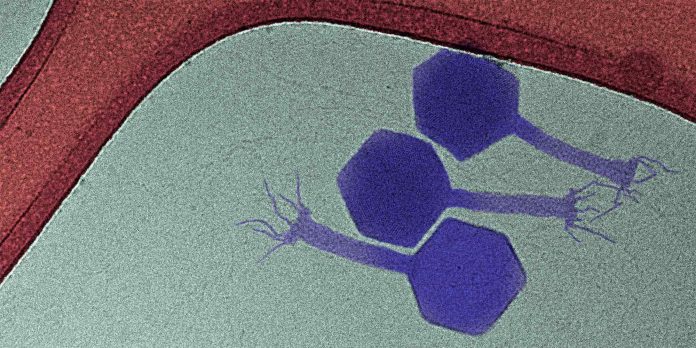Bakterinis dormancy is survival strategy in response to stressful exposure to antibiotics taken by a patient for treatment. The dormant cells become tolerant to antibiotics and are killed at slower rate and survive sometimes. This is called ‘antibiotic tolerance’ which is unlike antibiotic resistance when bakterijos grow in the presence of antibiotics. Chronic or relapsing infections are attributed to antibiotic tolerance, for which there is no effective treatment. Phage therapy has long been considered but the dormant bacterial cells are non-responsive and refractory to known bacteriophages. Scientists of ETH Zurich have identified a new bacteriophage that uniquely replicates on deep stationary-phase cultures of Pseudomonas aeruginosa. Named ‘Paride’, this bacteriophage could kill deep-dormant P. aeruginosa by direct lytic replication. Interestingly, this novel phage reduced bacterial loads through phage-antibiotic synergy when meropenem antibiotic was added to cultures. Apparently, the novel phage could exploit weak spots in the physiology of dormant bacteria to overcome antibiotic tolerance. These weak spots could be targets of new treatment for chronic infections caused by dormant or inactive bacteria.
Most bacteria on Earth are in dormant state of reduced metabolic activity or in completely inactive form of spore. Such bakterijų cells can be readily resuscitated when required nutrients and molecules become available.
Bakterinis dormancy or inactivity is the survival strategy in response to stressful external environmental conditions like starvation or exposure to antibiotics taken by a patient for treatment. In later case, the dormant cells become tolerant to antibiotics because cellular processes targeted by the antibiotics to kill bakterijos are turned down. This phenomenon is called ‘antibiotikų tolerancijaTokiu atveju bakterijos žūva lėčiau ir kartais išgyvena (skirtingai nei atsparumas antibiotikams kai bakterijos auga esant antibiotikams). Lėtinės arba pasikartojančios infekcijos priskiriamos neveikiančioms antibiotikams atsparioms bakterijų ląstelėms, dažnai vadinamoms „persistoriais“, kurioms nėra veiksmingo gydymo.
Phage therapy involving bacteriophages or phages (i.e., virusai that predate bakterijos), has long been considered for treating chronic infections by dormant or inactive bakterijos however this approach works when host bakterijų cells are undergoing growth. The dormant or inactive bakterijų cells, however, are non-responsive and refractory to the bacteriophages which either avoid adsorption to the bakterijų cell surfaces or hibernate in the dormant cells until resuscitation.
Known bacteriophages do not have ability to infect antibiotic-tolerant, deep-dormant or inactive bakterijos. It was thought that given diversity, phages with ability to infect dormant cells may exist in nature. Researchers have now identified one such novel bacteriophage for the first time.
Neseniai paskelbtame tyrime mokslininkai iš ETH Zurich praneša apie naujo bakteriofago, kuris unikaliai replikuojasi gilios stacionarios fazės kultūrose, išskyrimą. Pseudomonas aeruginosa laboratorijoje. Jie pavadino šį bakteriofagą Paride. Šis fagas gali nužudyti giliai miegančius P. aeruginosa tiesioginio lizinio replikacijos būdu. Įdomu tai, kad šis naujas fagas sumažino bakterijų apkrovą dėl fago ir antibiotikų sinergijos, kai buvo pridėta meropenemo antibiotiko. P. aeruginosa-fagų kultūros.
Matyt, naujasis fagas galėtų išnaudoti silpnąsias miegančių bakterijų fiziologijos vietas, kad įveiktų antibiotikų toleranciją. Šios silpnosios vietos gali būti naujo lėtinių infekcijų, kurias sukelia miegančios ar neaktyvios bakterijos, gydymo tikslai.
***
Nuoroda:
- Maffei, E., Woischnig, AK., Burkolter, MR ir kt. Fagas Paride gali nužudyti neveikiančias, antibiotikams atsparias Pseudomonas aeruginosa ląsteles tiesioginės lizinės replikacijos būdu. Nat Commun 15, 175 (2024). https://doi.org/10.1038/s41467-023-44157-3
***






































